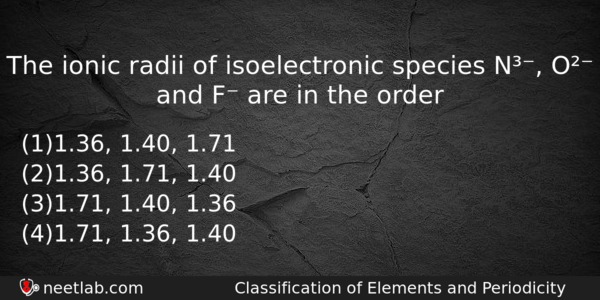| ⇦ | 
| ⇨ |
The ionic radii of isoelectronic species N³⁻, O²⁻ and F⁻ are in the order
Options
(a) 1.36, 1.40, 1.71
(b) 1.36, 1.71, 1.40
(c) 1.71, 1.40, 1.36
(d) 1.71, 1.36, 1.40
Correct Answer:
1.71, 1.40, 1.36
Explanation:
No explanation available. Be the first to write the explanation for this question by commenting below.
Related Questions: - 20.0 g of a magnesium carbonate sample decomposes on heating to give carbon dioxide
- The order of filling of electrons inthe orbitals of an atom will be
- If the gas at constant temperature and pressure expands, then its
- Structure of ICl₂⁻ is
- Among the following the least thermally stable is
Topics: Classification of Elements and Periodicity
(94)
Subject: Chemistry
(2512)
Important MCQs Based on Medical Entrance Examinations To Improve Your NEET Score
- 20.0 g of a magnesium carbonate sample decomposes on heating to give carbon dioxide
- The order of filling of electrons inthe orbitals of an atom will be
- If the gas at constant temperature and pressure expands, then its
- Structure of ICl₂⁻ is
- Among the following the least thermally stable is
Topics: Classification of Elements and Periodicity (94)
Subject: Chemistry (2512)
Important MCQs Based on Medical Entrance Examinations To Improve Your NEET Score
18000+ students are using NEETLab to improve their score. What about you?
Solve Previous Year MCQs, Mock Tests, Topicwise Practice Tests, Identify Weak Topics, Formula Flash cards and much more is available in NEETLab Android App to improve your NEET score.
Share this page with your friends

Leave a Reply